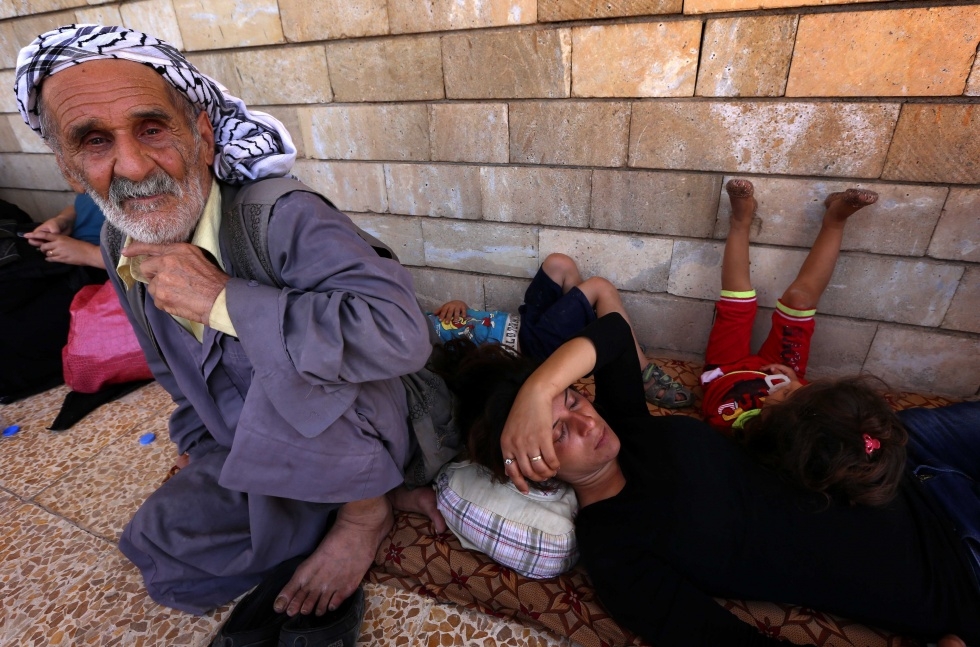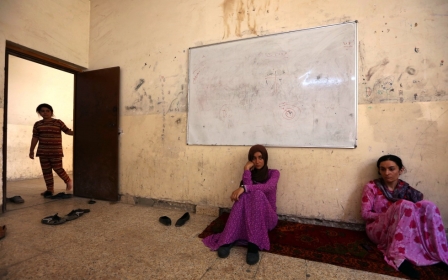Islamic State seizes Iraqi Christian town, sparks exodus

IS militants moved into Qaraqosh and other towns overnight after the withdrawal of Kurdish peshmerga troops, who are stretched thin across several fronts, residents said. Middle East Eye reporters who had tried to gain access to the town overnight were turned away by Kurdish forces who told them that IS was in control of the area.
"Qaraqosh, Tal Kayf, Bartella and Karamlesh have been emptied of their original population and are now under the control of the militants," Joseph Thomas, the Chaldean Catholic archbishop of Kirkuk and Sulaimaniyah, told AFP.
Entirely Christian Qaraqosh is lies between Mosul, where IS has its key Iraq base, and Erbil, the Kurdish region's capital. It usually has a population of around 50,000.
Tal Kayf, the home of a significant Christian community as well as members of the Shabak Shiite minority, also emptied overnight. Chaldean Patriarch Louis Sako, who heads Iraq's largest Christian denomination, said the overnight offensive had displaced 100,000 Christians, although these numbers have not been independently verified.
"Tal Kayf is now in the hands of the Islamic State. They faced no resistance and rolled in just after midnight," Boutros Sargon, a resident who fled and was reached by phone in Erbil, told AFP.
"I heard some gunshots last night and, when I looked outside, I saw a military convoy from the Islamic State... shouting 'Allahu Akbar' (God is greatest)."
Pope Francis urged the international community to protect Iraq's Christians, who have emigrated en masse over the past decade as a result of successive waves of violence.
Toby Dodge, director of the Middle East Centre at the London School of Economics, said he wasn’t surprised by the Islamic State’s drift northwards and Thursday’s developments.
“It was always a mystery why they [IS] went south,” Dodge said. “They are opportunistic. They pushed as far south as they could and now they’ve redoubled their efforts and pushing north and northwest.”
Without a militia, the Christian community in Sinjar is one of the most vulnerable in Iraq, and an easy target as IS continues an advance which says more about the weakness of the Iraqi state than the power of the group, he said.
Estimates released on Thursday indicate that the group has swollen to around 20,000, likely including many opportunists who have joined up because the group is “at the cutting edge as it were,” Dodge said.
Even if Iraqi Prime Minister Nuri al-Maliki is replaced, as looks increasingly probable, rebuilding the state will be tricky and IS’s exploitation of the country’s weaknesses is likely to continue, he said.
The news of the IS offensive comes just days after the group began a crackdown on Iraq's Yazidi population, sending tens of thousands fleeing into the mountains. According to Iraqi officials, some 500 Yazidi's have been killed in the offensive during the last week.
New MEE newsletter: Jerusalem Dispatch
Sign up to get the latest insights and analysis on Israel-Palestine, alongside Turkey Unpacked and other MEE newsletters
Middle East Eye delivers independent and unrivalled coverage and analysis of the Middle East, North Africa and beyond. To learn more about republishing this content and the associated fees, please fill out this form. More about MEE can be found here.



